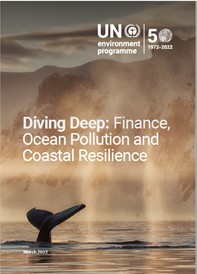3 March, 2022 | Publication, Resource and waste management

A key constraint to improving waste and resource management in many countries is a lack of access to investment finance. Extending waste collection to all and phasing out uncontrolled dumping and open burning in low-income countries would significantly cut the mass of plastics reaching the ocean. So the UNEP Finance Initiative publication Diving Deep, aimed at banks, insurers and institutional investors, is very welcome. Guidance is provided in the form of a science-based, actionable toolkit, to ensure that their investments, both in product manufacture and in waste management, encourage waste prevention and sound waste management, thus keeping plastics out of the oceans.
The promotional video and the document itself are worth looking at just for the wonderful images by world-renowned photographer Cristina Mittermeier of Sea Legacy. The guidance was prepared by WWF (led by Paula Chin) and RWA (led by Andy Whiteman). DCW played a small role as one of the reviewers.
16 September, 2021 | Publication, Resource and waste management
Professor David C Wilson is pleased to co-author an important new publication The Nine Development Bands: A conceptual framework and global theory of waste and development. The open access paper in ISWA’s peer-reviewed journal Waste Management & Research can be downloaded freely. The ‘9 DBs’ builds on the integrated sustainable waste management (ISWM) analytical framework to help characterise waste and resources management (WaRM) systems in cities and countries. Based on over 100 years of combined experience of the authors (Andrew Whiteman, Mike Webster and DCW), the 9DBs is a powerful addition to the waste management practitioner’s toolkit, bringing depth and nuance to understanding of WaRM systems globally.
The early DBs reflect stepwise improvement towards the new
baseline of meeting the SDG 11.6.1 indicators of universal collection and
management in controlled facilities (DB5); while later DBs represent two
prevailing routes to move towards environmentally sound management (ESM) and
the 3Rs (Reduce, Reuse, Recycle). An aspirational DB Zero, a real circular
economy, sits above all 9 DBs, accessible via multiple pathways, posing an
ultimate challenge for development practice. The 9DBs contextualise the
challenge of meeting the waste-related SDGs, in particular for developing
countries striving towards SDG 11.6.1 but also for all countries aspiring to a
circular economy. Whether you are a practitioner, decision-maker, service
provider, or sector activist, the 9DBs will help you to identify the key
pressure points for catalysing change, and focus your time and resources on
achieving maximum impact.
3 March, 2014 | Waste Management
GIZ have announced the finalisation of their work on Operator Models, focusing on how services for municipal solid waste management are delivered around the world, and analyzing the success factors and conditions for the different models. Based on an in-depth Sourcebook, a practical Guidance Paper was developed as a decision maker’s toolfor public authorities, development agencies and practitioners working to improve municipal solid waste management practices. Professor David C Wilson was one of the co-authors of the report, alongside Réka Soós, Andrew Whiteman and Cosmin Briciu of RWA and Ekkehard Schwehn of ERM Germany.
This project was part of the German Technical Cooperation Agency – GIZ’s sector project on Concepts for Sustainable Waste Management, which is a challenge to most local and national governments in developing countries. It aimed to fill a particular knowledge gap, on the delivery of waste management services or ‘operator models’ in cities around the world. Operator models are analysed in terms of the interactions between three key institutional components: the ‘client’ responsible for ensuring provision of a reliable municipal solid waste management (MSWM) service that meets the required standard; the operator who delivers the service on-the-ground; and the revenue collector who collects fees from the users. Theanalytical framework focuses on both the physical components of MSWM and the governance aspects. Information on existing operator models was collected from some 134 case studies, of which 28 were short-listed and five examined in the field.
The evidence suggests that all forms of ‘operator model’ for the delivery of solid waste and recycling services can be appropriate, with each model likely to be more suitable in particular ‘niches’ and according to the local circumstances. This contradicts the oft-presented view that private-sector service delivery is always better than public sector services, or that large service providers are ‘better’ than small informal sector or micro-enterprise service providers – the evidence is that all can work well given the right local conditions.
The detailed Source Book and Guidance Paper provide much information to assist in selecting an appropriate operator model tailored to the specific requirements of a particular local situation. The key findings focus on how framework conditions determine local objectives when selecting an operator model; the characteristics of a good model; conditions and capacities influencing the choice between public and private sector, and between municipal or inter-municipal, models; and detailed comparison of options for providing specific MSWM services.
